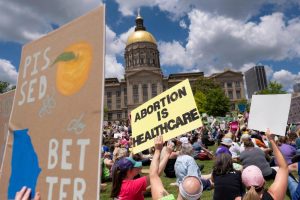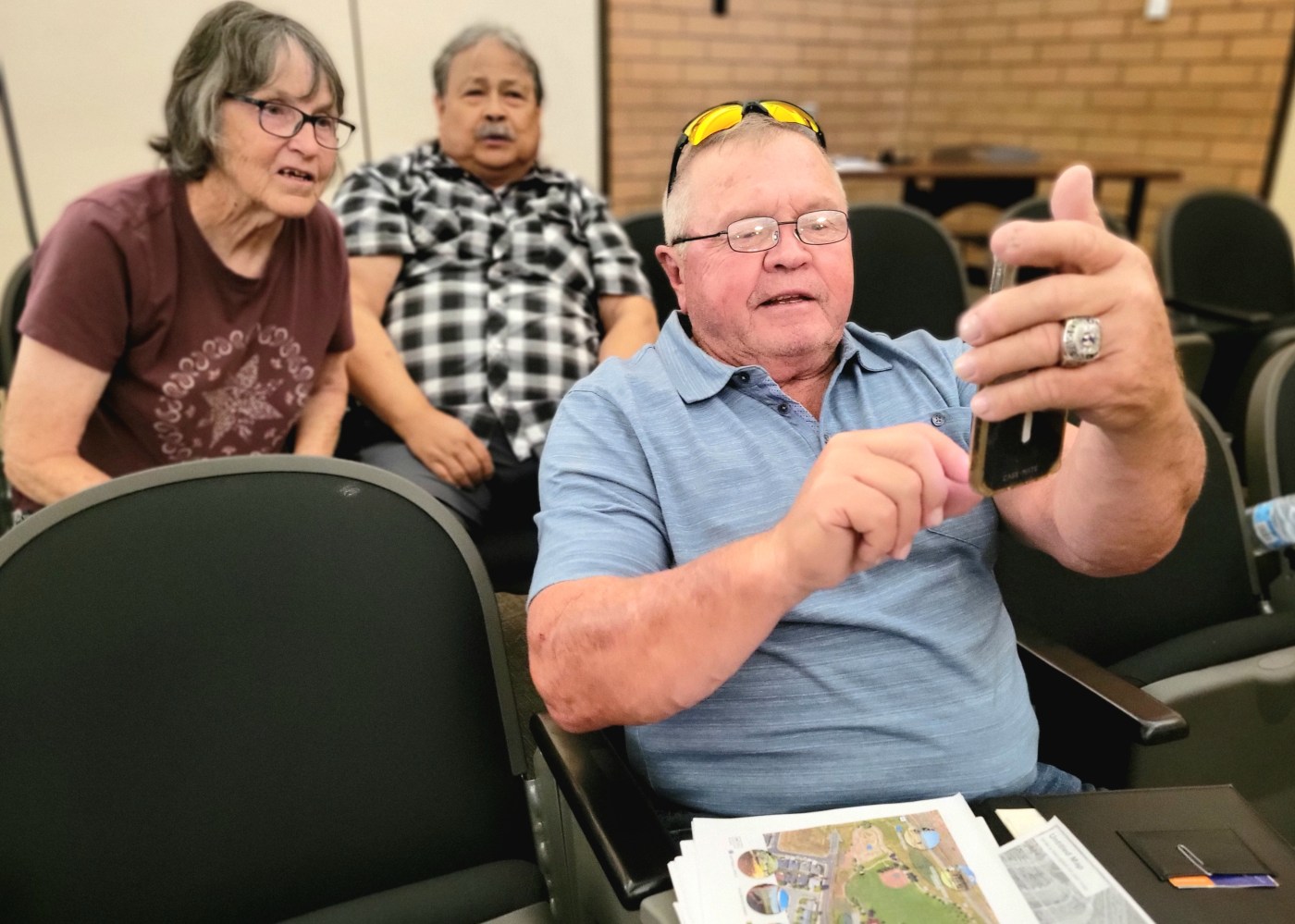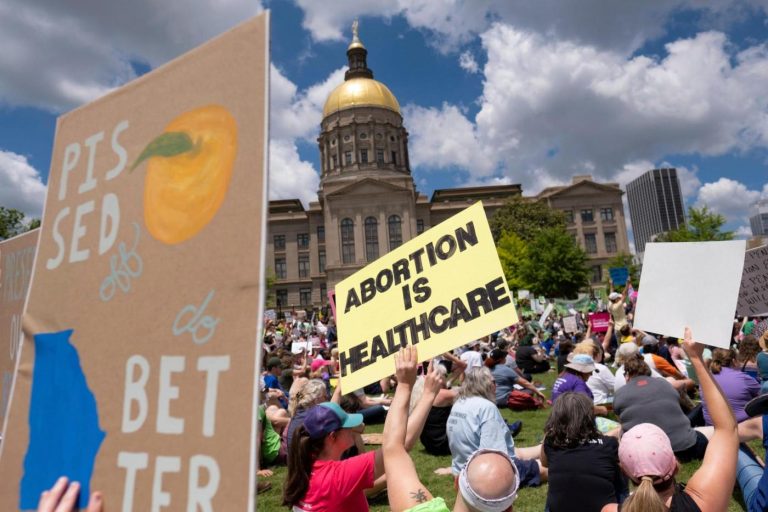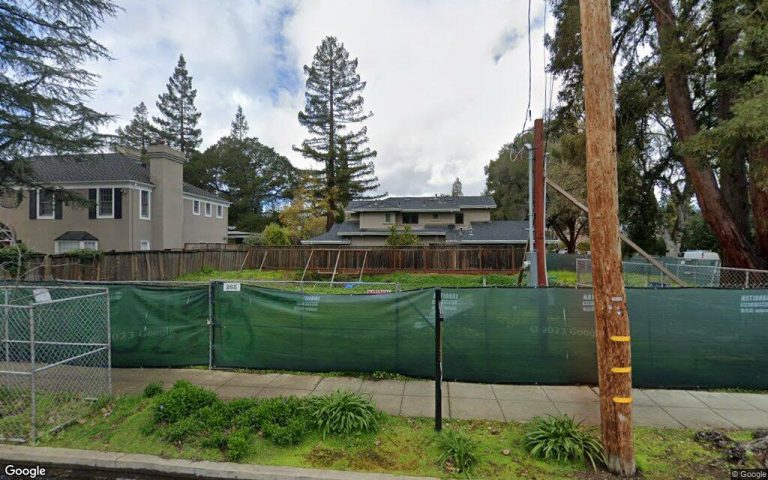CHICO — Residents of senior mobile home parks made their presence felt Tuesday evening when the Chico City Council continued its consideration of a rate stabilization ordinance.
Perhaps they should have brought signs, because their voices alone weren’t enough. With Vice Mayor Kasey Reynolds out ill and the chamber two-thirds full, councilors heard an hour of information and perspectives before deciding on a divided vote not to proceed any further.
On the flip side, the council gave final approvals for the 2024-25 budget and for revisions to housing codes, along with rezoning the Chico Nut property for multiuse; authorized planning staff to apply for a pro-housing designation from the state; and tasked two councilors with developing a committee on development.
City councilors, minus absent Vice Mayor Kasey Reynolds, convenes for the meeting Tuesday, June 18, 2024 in Chico, California. (Evan Tuchinsky/Enterprise-Record)
City councilors, minus absent Vice Mayor Kasey Reynolds, convenes for the meeting Tuesday, June 18, 2024 in Chico, California. (Evan Tuchinsky/Enterprise-Record)Chico has 16 mobile home parks with 1,704 spaces. Rents came to the council’s attention last fall when Pleasant Valley Mobile Estates issued increases up to 30%. After lobbying from the council, the out-of-state owner reduced the increases to 10%, matching bumps the previous two years — but residents lobbied for rent stabilization.
In March, following impassioned remarks from tenants and counterpoint from a park owners group’s representative, councilors voted unanimously to have City Attorney John Lam bring back options for an ordinance, despite several expressing resistance to restricting rents.
Consultant Tara Williams from Southern California-based RSG Inc. explained a range of options under the state Mobilehome Residency Law, which defines exemptions but doesn’t preclude local regulation.
“The (rent stabilization) program must balance both owners’ and residents’ interests,” she said, noting that mobile homes represent “a unique form of ownership exempt from most state protections.”
That balance includes a limit on rent increases while allowing park owners to increase rents “to ensure a fair return on investment and/or reimbursement for capital improvement expenses.” Sharing a half-dozen jurisdictions’ structures, which vary, Williams said that “there’s no one size fits all” across the state.
Starting a stabilization program would take 18 months and cost the city $100,000 to $150,000. The California Assembly has multiple bills introduced for statewide limits — all stalled due to legal challenges — but she said courts have upheld local ordinances.
Councilor Dale Bennett asked if the term “rent stabilization” versus “rent control” was a matter of semantics; Lam replied that “legally I don’t think there really is a distinction.” In response to Addison Winslow’s inquiry about the cost estimate, Lam said the effort entails more than just drafting an ordinance and “there are a lot of variables” involved in implementation.
Twelve public comments — six from tenants, four from park ownership, two from concerned citizens — addressed both sides of the issue. Pleasant Valley resident Dave Donnan said among the 16 parks, rent increases over the past three years range from none to 89%, with most over 25%. Multiple park representatives cited reduced maintenance and “unintentional affects” as consequences in other cities.
Kathy Vlach encouraged councilors not to make a quick decision, and Celeste Macklin pleaded, “Please, please consider the people that are living in these mobile homes, their situations and their health.”
Councilor Tom van Overbeek repeated a previous contention that he “fear(s) rent control would be a disaster” and rents are a factor of supply and demand. Deepika Tandon agreed that rent control “doesn’t help in the long run” but countered that restrictions on apartment rents in California cities haven’t stopped construction of complexes.
Tandon moved and Winslow seconded to continue developing an ordinance, but they were the only ones in favor. The 4-2 vote effectively halted the initiative, and residents departed disappointed.
Budget and building
After a series of motions and debates, the council voted to ratify the decision they made at the previous meeting to approve a budget of a $176 million for the fiscal year starting July 1 … though, with a few last-minute modification, it’s now a $177 million budget.
“We did incorporate the additions the council requested,” City Manager Mark Sorensen said — but then Tandon, absent from the budget sessions, requested an extra $110,000 to keep the library open an additional day, and van Overbeek sought a $500,000 revenue guarantee ($250,000 more than budgeted) and $300,000 for terminal upgrades from Fire Victims Trust funding to land a commercial airline at Chico Regional Airport.
Sean Morgan already made the motion to approve the budget as presented and rejected both suggestions. Van Overbeek made a substitute motion to incorporate his suggestion, and Tandon made another substitute motion for her request and his. The latter carried 4-2, with Morgan and Winslow opposed.
Three other matters related to building.
Morgan requested May 22 that his colleagues consider a committee of councilors, staff and community members to discuss growth and future development in special planning areas such as Valley’s Edge. He also suggested inviting the Butte Local Agency Formation Commission to the table.
Tuesday, Morgan lateraled to van Overbeek, who’d reached out to a range of stakeholders. Van Overbeek proposed he and Winslow formulate a panel called the Committee on Growth and Community Development to bring to the council for the July meeting. It passed 6-0.
Supporting a move for which Winslow advocated, the council voted unanimously to let the Community Development Department apply for recognition under the California Department of Housing and Community Development’s Prohousing Designation Program to boost the city’s opportunities for funding. Councilors also confirmed a previous decision to approve housing code updates and the Chico Nut rezone, both on the consent agenda for routine matters enacted on a single vote.
Other items
• Also from the consent agenda, the council unanimously approved four property acquisitions for the Commerce Gap Closure Project in south Chico and placed four council district elections plus a revision to the Measure H sales tax on the November ballot. Former Mayor Karl Ory addressed the latter, suggesting citizen oversight and a sunset for the tax.
Related Articles
Candidates emerging for council, school board in Chico
Oroville seeks system for better communication with citizens
Mobile home rents back before Chico council
Very low income housing by Housing Authority up for consideration
Paradise extends police recruitment incentive plan
• Two presentations on broadband relayed the progress toward high-speed internet service in Chico. Race Communications has begun work to serve 46,000 households, with the first customers served in December and work expected to finish in 2026. City-initiated North Valley Fiber received $5.3 million in funding, is up for another $12 million and plans to start construction on its pilot location (in and around the Chapman neighborhood) next spring.
• Councilors heard an appeal of the sewer assessment for a Mangrove Avenue property with two water meters. Appellant Daniel Hays challenged the usage calculation component and requested the council postpone its decision to a future meeting to “digest” the data — and on a 5-1 vote with Winslow opposed, the matter got referred to the Internal Affairs Committee for additional exploration.
• In closed session, councilors conferred with legal counsel on Warren v. Chico and two cases involving opioid manufacturers; no action was taken. Lam also announced that scheduled updates on labor negotiations got pulled off the agenda.













+ There are no comments
Add yours